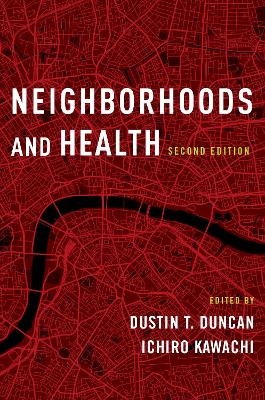
Neighborhoods and Health
Oxford University Press Inc (Verlag)
978-0-19-084350-2 (ISBN)
In 2003, Neighborhoods and Health codified the idea that a neighborhood's social and physical makeup can influence the health of people who live in it.
More than a decade later, with the relationship between place and health firmly entrenched at the center of how we understand public health (and as its own scientific discipline, spatial epidemiology), this second edition of the landmark text offers another giant leap forward for the field.
Offering both a synthesis of the essential research and a practical overview of the methods used to garner it, the second edition of Neighborhoods and Health is the essential guide to understanding this core component of contemporary population health -- both the journey to date and what's next.
Dustin T. Duncan, ScD, is an Associate Professor in the Department of Population Health at the New York University School of Medicine, where he directs the NYU Spatial Epidemiology Lab. As a social and spatial epidemiologist, he studies how specific neighborhood characteristics influence population health and health disparities. His work includes applying emerging geospatial technologies such as Global Positioning System (GPS) devices and smart phones to, in part, examine mobility and social networks in neighborhoods. Dr. Duncan completed his doctorate and the Alonzo Smythe Yerby Postdoctoral Fellowship, both in social epidemiology, at the Harvard University T.H. Chan School of Public Health. Ichiro Kawachi, MD, PhD, is the John L. Loeb and Frances Lehman Loeb Professor of Social Epidemiology and Chair of the Department of Social & Behavioral Sciences at Harvard T.H. Chan School of Public Health, where he has taught since 1992. He has previously co-edited Behavioral Economics and Public Health, Social Epidemiology, Globalization and Health, and the Oxford Handbook of Public Health Practice, all published by Oxford University Press. Kawachi lectures about social epidemiology through the Harvard University Massive Open Online Course (MOOC) platform, edX. His course, "Health and Society" (PHx 201), is a version of the class that he has taught for twenty years at Harvard. In 2013-1014, 35,000 students from all over the world were enrolled in the MOOC course.
Foreword
Ana V. Diez Roux
1. Neighborhoods and Health: A Progress Report
Dustin T. Duncan and Ichiro Kawachi
2. Operationalizing Neighborhood Definitions in Health Research: Spatial Misclassification and Other Issues
Dustin T. Duncan, Seann D. Regan, and Basile Chaix
3. Quantitative Methods for Measuring Neighborhood Characteristics in Neighborhood Health Research
Dustin T. Duncan, William C. Goedel, and Rumi Chunara
4. Statistical Methods in Spatial Epidemiology
Samson Gebreab
5. Agent Based Models
Brenda Heaton, Abdulrahman El-Sayed, and Sandro Galea
6. Experimental and quasi-experimental designs in neighborhood health effects research: Strengthening causal inference and promoting translation
Nicole M. Schmidt, Quynh C. Nguyen, and Theresa L. Osypuk
7. Qualitative Methods and Neighborhood Health Research
Danya E. Keene
8. Designing Healthier Built Environments
Pedro Gullón Tosio and Gina S. Lovasi
9. Food Environment and Health
Jason Block, Michael Seward, Peter James
10. Neighborhoods, Social Stigma, and Health
Danya E. Keene and Mark B. Padilla
11. Neighborhood Foreclosure and Health
Maraina Arcaya
12. Residential Segregation and Health
Michael R. Kramer
Index
| Erscheinungsdatum | 25.04.2018 |
|---|---|
| Vorwort | Ana V. Diez Roux |
| Verlagsort | New York |
| Sprache | englisch |
| Maße | 155 x 231 mm |
| Gewicht | 544 g |
| Themenwelt | Studium ► Querschnittsbereiche ► Epidemiologie / Med. Biometrie |
| Studium ► Querschnittsbereiche ► Prävention / Gesundheitsförderung | |
| ISBN-10 | 0-19-084350-0 / 0190843500 |
| ISBN-13 | 978-0-19-084350-2 / 9780190843502 |
| Zustand | Neuware |
| Haben Sie eine Frage zum Produkt? |
aus dem Bereich


